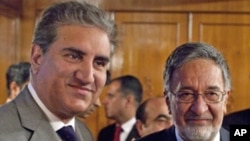The governments of Pakistan and Afghanistan have agreed to establish a joint commission to enhance their fight against militancy.
Pakistani Foreign Minister Shah Mehmood Qureshi announced the formation of the new commission at the end of a meeting in Islamabad with his visiting Afghan counterpart, Zalmay Rassoul. Speaking at a joint news conference, Mr. Qureshi reiterated that Pakistan is committed to the fight against terrorism.
"We will set up a two-tiered joint commission at the foreign ministers' level and at the level of senior officials," he said. "And in this joint commission, we will have the Foreign Office, the military and the intelligence jointly engaging with each other and working together to achieve peace and security in the region."
The Pakistani foreign minister says the continued high-level process of engagements has helped build a strong relationship and partnership between Islamabad and Kabul to achieve their shared objectives. He said the two sides also agreed to set up joint working groups to enhance bilateral trade, and economic and social ties.
As the Pakistani foreign minister put it, the two sides have agreed to jointly write a new chapter in bilateral relations.
"The most important thing is, and that has been the crux of our discussions today, that if we want progress we have to be strategically aligned. And that is exactly what we have done and we are doing this successfully and this will bring, in the days to come, positive results," Mr. Qureshi said.
Afghan Foreign Minister Rassoul also was described his talks as "positive and productive," saying they will further strengthen relations with Pakistan.
He reiterated that efforts the Afghan government is making to promote reintegration and reconciliation with Taliban insurgents cannot succeed without Pakistan's support.
"At the moment we are engaged in the re-integration process more, that means bringing on board those foot-soldiers who are not ideologically linked to the terrorist groups, al-Qaida, and others," Rassoul said. "It is a difficult process. I think the process is in the right direction, but it will take time to give you tangible results."
Pakistan was one of the three countries that supported the Taliban government in Afghanistan until the Islamic group was ousted by U.S-led coalition forces. The government of Afghan President Hamid Karzai wants Pakistan to use its influence over senior Taliban commanders to bring them to the negotiating table.
U.S. and Afghan officials have also alleged senior Taliban leaders, including the group's head, Mullah Omar, are leading the Afghan insurgency from hideouts in Pakistan.
Elements within the Pakistani security establishment are also accused of supporting fugitive al-Qaida fighters and the Haqani network of Afghan militants to launch cross-border attacks on U.S-led international forces.




